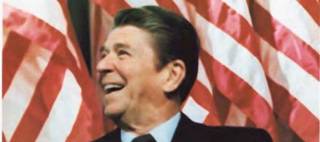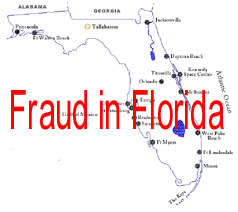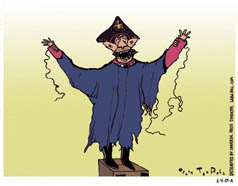The Great Appeaser

Like any liberal, I am profoundly ambivalent about Ronald Reagan. His domestic policies were small-minded, his vision extending no further than the constricted perspective of his class and time. Through a remarkable confluence of luck, personal charm, optimism and a natural garrulousness, he had rocketed from humble beginnings in the midwest of the depression era, son of an alcoholic loser, to a life of acclaim and glamour in Hollywood. The ease with which he accomplished this, the apparent fluidity of this progression, imbued in Reagan the conviction that there were no problems that couldn't be overcome with pluck and grit, a naive and ingenuous outlook that spoke soothingly to a constituency weary of the battle for social justice after 20 years of hard won progress, but an outlook that translated into politics that widened the divisions in our society into chasms that to this day paralyze our ability to deal with social problems, a paralysis that leaves the wealthiest nation on earth an also-ran among its western peers in terms of educating its children, caring for its elderly, providing health care to its impoverished and protecting its weakest against the scourges of violence, drug addiction and despair.
These are the hard truths about Ronald Reagan.
He opposed the Civil Rights Act of 1964. He opposed the Voting Rights Act of 1965. He opposed Medicare. He was consistently on the wrong side of history on every major domestic initiative during an era in which this country finally, after nearly 200 years, resolved to give full meaning to the promise of the constitution. With respect to the great foreign policy issue of the day, Reagan favored a limitless commitment to the war in Vietnam and expansion of the war in southeast asia. "We should declare war on North Vietnam," Reagan insisted. "It's silly talking about how many years we will have to spend in the jungles of Vietnam when we could pave the whole country and put parking strips on it, and be home by Christmas." Even as the rest of the republican party was looking for the exits in Vietnam, Reagan foolishly persisted in the delusion that victory in Vietnam was attainable.
Ronald Reagan does deserve credit, however, for resisting the temptation to impulsively and blindly retaliate in response to a string of terrorist attacks against the U.S. in the mid-1980's - the bombing of the U.S. embassy in Beirut in April 1983, the Beirut barracks bombing in October 1983, the bombing of the U.S. embassy in Kuwait in December 1983, the bombing of the U.S. embassy annex in Lebanon in September 1984, the bombing of Pan Am flight 103 in 1988. It took courage to withdraw from Lebanon following the barracks bombing that claimed 241 American lives, to admit that he had been wrong to deploy the marines in Lebanon and that there was no U.S. objective in Lebanon that justified risking American lives. Reagan refused to permit a minute, radical element of Islam to goad him into declaring war against a billion people.
If any of the Reagan hagiographers who will flood the airwaves in the next 48 hours were true to their republican convictions about the necessity of waging a war against terrorism, they would be compelled to excoriate Reagan for his fecklessess and weakness in the face of terrorism, his "failure to understand" the nature of the terror threat. They would have to condemn him for permitting Islamic radicals to believe they could strike at America with impunity. They would have to lay at Reagan's feet substantial responsibility for the terror attacks of the last 11 years that culminated in 9/11. If republicans were right about the necessity of waging war against terrorism, then one would have to conclude that on the issue of terrorism Ronald Reagan was yet again on the wrong side of history.
But of course Ronald Reagan was not on the wrong side of history on the issue of terrorism. As distorted as Reagan's sepia-toned image of America frequently was, it was absolutely precise in its evocation of the gentle giant, slow to anger but fierce in its determination to defend its liberty, a nation with an innate understanding that it would be judged by the rest of the world and by history not by the strength of its armies or the vastness of its wealth but by the restraint and wisdom with which it exercised the prerogatives of great power. Ronald Reagan's America was wary but not fearful, resolute but not vengeful. In this respect Ronald Reagan's vision of America was true and right, and in this respect Ronald Reagan's vision of America stands in stark contrast to the vision of America that prevails in today's republican party.
I have no doubt, however, that the Deserter and Newt and Billy Kristol and all the rest of the midgets will manage to overlook these inconvenient truths while they canonize Reagan over the airwaves. But make no mistake: the same people who will lionize Reagan in the coming days have for the last three years implicity damned Reagan's terror policy as appeasement, and located him on the wrong side of history on the most significant issue of our time.




1 Comments:
Thanks, Goldstein, for a timely analysis that exhibits the nuance, insight, and grasp of history so lacking in the arguments of the wingnuts. But not all of us share your ambivalence about dear old Ron.
I suspect that you give Reagan a little too much credit for his restraint. America was not, or was not recognized to be, the world's sole superpower until late in Reagan's tenure. If not for the threat that the USSR would become involved in any international dispute, would Reagan have hesitated to turn Lebanon into a parking lot? Even so, he didn't hesitate to send arms to the Middle East and southwest Asia on numerous occasions. After the fall of the Soviet Union, he appointed the always jingoistic and bellicose Dick Cheney as his SecDef. Was Reagan really so courageous, a different man than the one who advocated a wider war in southeast Asia twenty years earlier? Or did he merely lack the opportunity for unencumbered aggression that the Deserter has had? We can only hope that the Deserter has learned the hard lesson that Vietnam should have taught - that the promise of Mutually Assured Destruction should not be the only barrier to aggression. Or better, that the American people will see the madness of permitting a second term to one who callously seeks personal and political advantage in foreign adventures at the expense of American lives and prestige. Indeed, if temperance remains a virtue in the 21st century, then the very soul of America is at stake.
Post a Comment
<< Home